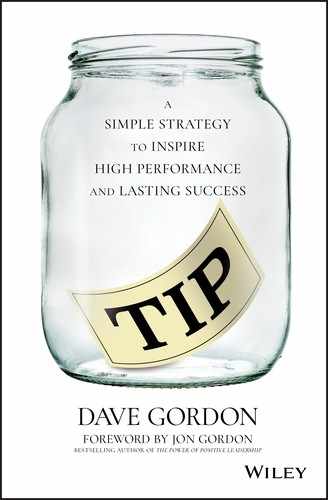16
Flow
Seven weeks behind the bar and Brian was incredibly comfortable. Not only was he a better bartender, but Tara Traynor was right; he was becoming a better person. He was meeting many wonderful people who would share their stories of second chances with him, but he also met a number of people who were very unhappy with their jobs and unwilling to do anything about it, except complain. Brian was curious about happiness, and with experience as his aspirational brand, he wanted to know more. He decided to ask the seemingly happy people where and how they found their joy. The answers were always the same. They felt challenged. They felt a sense of purpose. They felt like they had a particular set of skills and were using their talents to make a difference in the world. One patron even gave Brian a copy of the book Flow by psychologist Mihaly Csikszentmihalyi, who wrote about the creation of “optimal experience.” The author said that what makes an experience genuinely satisfying is a state of consciousness called flow. During flow, people typically experience deep enjoyment, creativity, and a total involvement with work and life. Brian was taken aback when he discovered the six factors that encompassed an optimal “flow” experience:
As Brian thought about his previous job and his jobs before that, he couldn’t help but think about “flow” and the lack of it he had. He was never focused on the present. Always worried about the future. Watching the clock. He was always self-conscious about what this boss or his colleagues thought about him. He never felt in control of any situation, always having to answer to someone or get approval from someone. He always felt like every minute of every day was just there to torture him, and he certainly didn’t feel any joy in his job where it felt like it was intrinsically rewarding. The job was a paycheck. As he reflected on his almost two months behind the bar, he thought about creating optimal experiences, not only for himself, but for others. As his skills increased and he was able to create a better experience for his patrons, he took accountability for the quality of their experience. In doing so, his own experience at work began to change, and he was, in his own evaluation, experiencing flow. The hours flew by, altering the perception of time, even in the late hours. He was only in the present, aware of everything around him. He was in control of everyone’s experience, providing great service, and at the end of the night, felt like he made a difference in helping people get happier. Not a bad way to make a buck. But was it possible to translate that kind of work into a long-term career? With three weeks before his temporary run at Crossroads was over, he began to narrow his focus to industries and jobs where the value he could provide, based on his present and potential future skills, would create an optimal experience for himself and his future customers. Like the bartending, he knew that whatever he wanted to do in the future might not come easy at first, but he was no longer afraid to be uncomfortable, work hard, or to be challenged to become the best possible version of himself.
